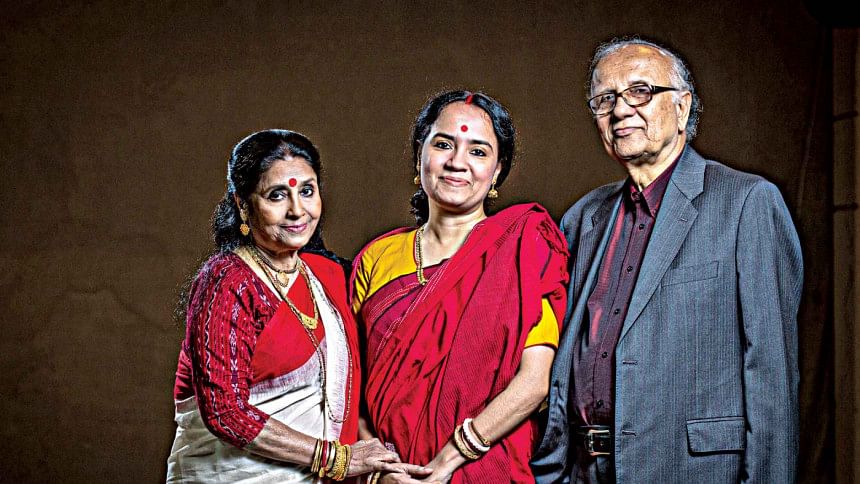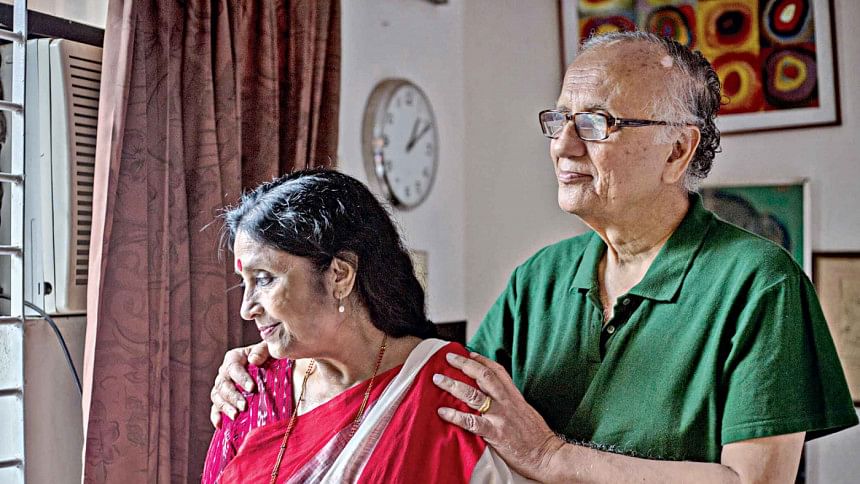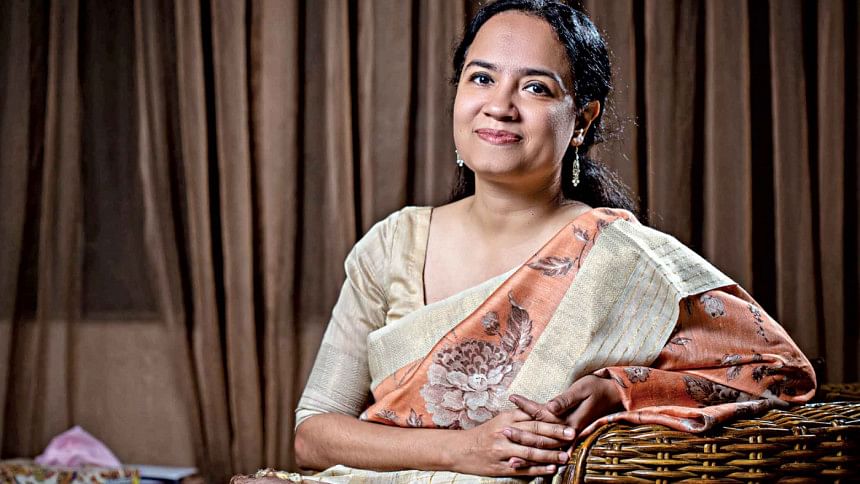PERSONAL MUSINGS

Rafi Hossain: Today we are joined by special guests, Ramendu Majumdar, Ferdousi Majumdar and Tropa Majumdar. Do either of you, Ramendu Majumdar or Ferdousi Majumdar wish that maybe Tropa learnt music before heading straight into acting?
Ferdousi Majumdar: I don't have any hard feelings about her not learning music, but in my life, one of the biggest regrets I have is not learning to sing. Once you reach a certain age, it becomes difficult to act in particular roles. But, if I had learnt how to sing, then it might have been different for me. When I was young, any form of singing and dancing was not allowed in my house, but whenever my siblings and I got the chance, we would always sing together. We never were taught or trained in music, but we all shared an understanding of music in us. Since it was a regret of mine, that's why I wanted Tropa to learn singing. But I remember when Tropa was still very young, I would be rehearsing my lines at the house all the time, and often Tropa was there when I would rehearse. Amazingly, she would remember all the lines, which I had rehearsed in front of her, and since then, I knew where her interest lies. She would always be very interested in theatre, even when she was still in school. I knew then that no matter how hard I tried to get her to learn music, she would head in the direction where her heart calls.

Rafi Hossain: Tropa, which do you prefer more, the theatre or the television?
Tropa Majumdar: For me, television as a medium has never been all that exciting, and I think my mother feels the same. Theatre was all that I had known till class seven, and it has always been a part of my life. My parents have always tried to get me into learning music. They have admitted me into Chhayanaut 3 times, my father bought a tanpura from Kolkata, and even my uncle encouraged me a lot. Although I love music, I could never devote myself to it. Instead, because of my parents, I got myself into the theatre industry.
Rafi: Ferdousi Apa, how did you learn to remember long dialogues quickly?
Ferdousi: When I was a young girl, my father would ask me how come I never study, but if I would somehow memorize something that interested me. I have no idea how I learnt to do this, but this is how it has always been for me. Someone told me that if I had studied for my honours the way I memorized lines for plays, then I might have even got exceptional grades. But the truth is I never felt motivated to study for them, and when you force yourself to do something you do not enjoy, then it is not possible to do great there.
Rafi: You both have such a wonderful married life together, and after 51 years of companionship, you both are still leading such a wonderful life together. What is your secret to this?
Ferdousi: We have struggled a lot to get where we are now. We had to live in many different places, first in Karachi, then Delhi and then finally in Dhaka, to settle down. I began working in the advertisement sector after my marriage. I joined an advertising agency as a copywriter while in Karachi. The main thing in our marriage is the mutual understanding we share. We trust each other completely, help each other whenever we can, and care for each other. My daughter even says that I spoil her mother by doing so much for her. But I enjoy doing things for her. I try to do those small things like, whenever we get in a car, I always open the door for her to get in smoothly.
Rafi: How do you feel about your parents' relationship?
Tropa: There is a lot of mutual respect between my parents. No matter how they are in public, they will never say anything disrespectful about one another in front of someone else. They are also very independent when it comes to the household. They each do their things without interrupting the other. As such, they have created a very healthy and balanced relationship. It's interesting because my husband and I are very different. We often have varied or conflicting opinions, and we are very outspoken about them. But we have still been fine together for 19 years now, and I think that is because we give each other space. I believe that is very important and helpful in sustaining a relationship.
Rafi: Nowadays, we see that there are so many cases of people getting married but decided to split in a short amount of time. Why do you think that people have become like this?
Ferdousi: I think that people are less tolerant nowadays. There must be some elements of forgiveness when you get married, and people nowadays lack that. When you get married, one must remember that they both come from different families, so you both may have separate teachings. It is essential to respect the other person's values and learnings in a marriage. In my marriage, there are times when I can do something where I don't need to consult my husband, but I do tell him before I do it because I respect him.
Ramendu: I agree people nowadays do not always like to accept or tolerate much. They always seem to prefer their interests. You need to be more tolerant if you are to have a successful marriage. I think that our society is becoming more and more intolerant and affecting how people think. That causes many people to split.
Tropa: A lot of people nowadays say that you should live life for yourself. I, however, believe that is not very meaningful and seems individualistic. It is something I have learned since I was very young and something I accredit my father. He is incredibly humble and holds a deep respect for everyone, not just my mother. Regardless of age or whether he knows them or not, he will treat everyone the same. From him, I have learned that to live for others holds much more meaning than to only live for oneself. So, even in a bond like marriage, it is not just about two people sharing mutual respect, but respect that branches out to several other people.
Rafi: What do you think people should do to sustain their relationships?
Tropa: My parents have always given me a lot of freedom. Even when I left my job at the university, they did not say anything. They have always told me to do what I feel is right, and it is not like I was spoiled with affection either. However, I was taught that freedom is a responsibility. I think this is the lesson parents should give their kids. They should never do anything wrong or hurt their parents with this freedom given to them. This advice will be helpful for them throughout their lives and eventually in their future relationships. Before making any crucial decisions till today, I always think about my parents and how they would feel.

Rafi: Tropa, do you think your daughter ever feels inspired watching you perform?
Tropa: I once got my daughter admitted into Chhayanaut because she was interested in playing the violin. After two to three days, she came back home crying because her peers and her teacher singled her out as she was "Ramendu Majumdar's granddaughter." She does not like any such special treatment or attention at all. Nowadays, her interests are much more diverse. She is very interested in sports, especially football. She likes playing instruments like the guitar and the violin. Sometimes she likes playing table tennis or even swimming. These hobbies change over time. But when it comes to theatre, I would not say she is as excited about it.
Rafi: Is there anything positive you notice in your daughter's generation?
Tropa: One of the things I am very proud of is that she does not appreciate when we judge other people. Our generation has somewhat become used to commenting on strangers despite not knowing them personally. My daughter, however, is against this practice. She is quick to call out such instances and is very much against body shaming. I think this is very positive in their generation and something we can all learn from them.
Rafi: Do you think talent has changed in its form in the new generation?
Tropa: Definitely to a certain extent. Nowadays, technology is integrated into our life. As such, the focus has shifted from the arts and culture to science and innovation, which is also a good thing. There are equally talented people working in both fields, but I think this is why we are seeing fewer artists nowadays. I do hope Bangladesh as a country does not deviate from its own culture because of this.
Rafi: I think that we are losing the number of talented people nowadays. In the past, we had more talented people showcasing their skills. What do you think?
Ramendu: I don't think there is any reason to think that way. If we keep thinking that everything was better in the past, it just shows we are not adapting to the current times. Being stuck in the past only makes it harder for you to fit into society. There is a lot to learn from the younger generation, so it would be wrong to dismiss them.
Rafi: During the pandemic, we lost a lot of people who were important to our culture. How do you think the industry will recover from these losses?
Ferdousi: We lost many good people, and I don't think their places are meant to be filled with other people. Their legacies are left behind so that not just us but the generations coming after us can look up and learn from them.
Rafi: Is there anything in your career that you still want to do or that you have not been able to do before?
Ferdousi: There are many things which I still want to do. I worked very hard to get into acting as I love it a lot. So, there is always a desire to do more. Tropa says that since I got to do such amazing roles, I shouldn't always be having the desire to do more, but I always wish that I could have been able to do a unique role. I do wish that someone would write a role for me at this age, where I can still play a unique character. Then I would have worked very hard to give that role everything I had.
Ramendu: I started my career as an actor, but slowly I shifted to working more with organizations. Through my work, I got to represent Bangladesh all over the world. Even though that gave me a lot of satisfaction, I wish I could have spent more time with my writings. But, during the pandemic, I got to spend my time writing a book.
Rafi: Thank you so much for the lovely discussion.

 For all latest news, follow The Daily Star's Google News channel.
For all latest news, follow The Daily Star's Google News channel. 



Comments